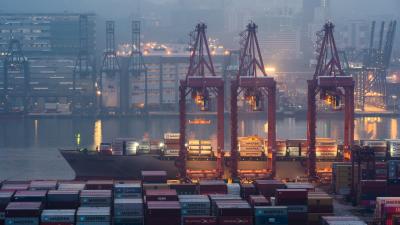
Data-Centric Engineering programme
Bringing together world-leading academic institutions and major industrial partners from across the engineering sector, to address new challenges in data-centric engineering.
Discover how Lloyd's Register Foundation is ensuring critical infrastructure is safe, resilient and fit for purpose to meet the changing needs of society.
UNEP estimate that infrastructure is responsible for 79% of all greenhouse gas emissions.

Higher temperatures, rising sea levels, and more frequent severe weather patterns all expose vulnerabilities in our infrastructure systems. AI and autonomy will disrupt how we design, build and operate critical infrastructure. And the urgent technical, social and physical changes needed to successfully decarbonise industry pose a significant threat to people’s safety.
Lloyd’s Register Foundation’s mission is to ensure that critical infrastructure is adapted to be resilient, safe and sustainable for years to come. Working with partners to ensure we maximise the benefits of emerging technologies, and putting the safety of people at the heart of advances in big data.
Our work is helping decarbonise maritime trade and generate clean energy from the oceans, whilst championing whole systems thinking throughout the engineering sector.
Explore our work in this area below.
Live safer sustainable infrastructure grants.
Countries receiving funding in this area.
Current value of grant portfolio in this area.
This page was published on
This page is approximately a 5 minute read
In this blog, our Programme Manager, Muntair Hashim discusses the potential of new technologies to transform how we support the safety of workers, and the challenges of adopting these systems safely.
This page was published on
This page is approximately a 5 minute read
In this blog, Lloyd's Register Foundation's Chief Executive, Ruth Boumphrey, and Alfredo Giron, Head of Ocean at the World Economic Forum, establish a bold new vision for a nature and people-positive port ecosystem.
This page was published on
This page is approximately a 5 minute read
New Climate Risk Assessments for ports
This page was published on
This page is approximately a 4 minute read
Lloyd’s Register Foundation has today announced the start of a new Foresight review on the safe adoption of AI.
Critical infrastructure is under increasing pressure from ageing systems, climate impacts, and accelerating technological change. Lloyd’s Register Foundation works with global partners to strengthen safety, reliability, and resilience by supporting evidence‑based solutions that protect the people who design, operate, and depend on these essential systems.
Jan Przydatek Director of Technologies
Focusing on the increasing deployment of cyber-physical systems, the scaling of sustainable assets and the adaptation of infrastructures to the effects of climate change, our strategy targets safer outcomes for all.




